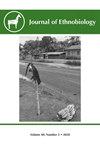Toward a Joyful Environmental Ethic: Open-Ended Curiosity as an Environmental Virtue
IF 1.3
3区 社会学
Q1 ANTHROPOLOGY
引用次数: 0
Abstract
This paper seeks to advance the joyful environmental ethic of Robin Wall Kimmerer. According to Kimmerer's environmental ethic of gratitude and reciprocity, each person has a responsibility to share their unique gifts with the world in return for the gifts they have received from nature. Drawing on Karen Barad, this paper contends that nonhumans are active, open-ended, and relational singularities that also provide ontological gifts by coconstituting the very being of humans and the world. Since sharing one's gifts to make good gifts for a nonhuman requires knowing oneself and the nonhuman, this paper argues that open-ended curiosity is an onto-epistemic, environmental virtue because it enables humans to understand nonhumans as open-ended and relational singularities. Epistemically, a person must be open to transforming their beliefs and questions in relation to nonhumans. Ontologically, a person must be open to transforming their bodies, practices, and world in relation to nonhumans. To develop this account of open-ended curiosity, this paper engages the work of Vinciane Despret.走向快乐的环境伦理:作为环境美德的开放式好奇心
本文试图推进罗宾·沃尔·基默勒的快乐环境伦理。根据Kimmerer的感恩和互惠的环境伦理,每个人都有责任与世界分享他们独特的礼物,以换取他们从大自然那里得到的礼物。本文借鉴了Karen Barad的观点,认为非人类是活跃的、开放的和关系的奇点,它们也通过共同构成人类和世界的存在来提供本体论礼物。由于分享礼物为非人类制作好礼物需要了解自己和非人类,本文认为开放式好奇心是一种基于认识的环境美德,因为它使人类能够将非人类理解为开放式和关系型的奇点。从认识论上讲,一个人必须对改变他们与非人类的信仰和问题持开放态度。从本体论角度讲,一个人必须对改变自己的身体、实践和与非人类相关的世界持开放态度。为了发展这种开放式好奇心的描述,本文参与了Vinciane Despret的工作。
本文章由计算机程序翻译,如有差异,请以英文原文为准。
求助全文
约1分钟内获得全文
求助全文
来源期刊

Journal of Ethnobiology
Social Sciences-Anthropology
CiteScore
4.80
自引率
3.40%
发文量
21
审稿时长
>12 weeks
期刊介绍:
JoE’s readership is as wide and diverse as ethnobiology itself, with readers spanning from both the natural and social sciences. Not surprisingly, a glance at the papers published in the Journal reveals the depth and breadth of topics, extending from studies in archaeology and the origins of agriculture, to folk classification systems, to food composition, plants, birds, mammals, fungi and everything in between.
Research areas published in JoE include but are not limited to neo- and paleo-ethnobiology, zooarchaeology, ethnobotany, ethnozoology, ethnopharmacology, ethnoecology, linguistic ethnobiology, human paleoecology, and many other related fields of study within anthropology and biology, such as taxonomy, conservation biology, ethnography, political ecology, and cognitive and cultural anthropology.
JoE does not limit itself to a single perspective, approach or discipline, but seeks to represent the full spectrum and wide diversity of the field of ethnobiology, including cognitive, symbolic, linguistic, ecological, and economic aspects of human interactions with our living world. Articles that significantly advance ethnobiological theory and/or methodology are particularly welcome, as well as studies bridging across disciplines and knowledge systems. JoE does not publish uncontextualized data such as species lists; appropriate submissions must elaborate on the ethnobiological context of findings.
 求助内容:
求助内容: 应助结果提醒方式:
应助结果提醒方式:


